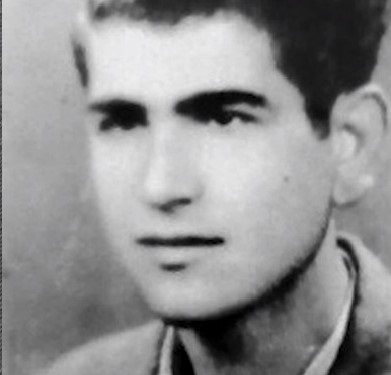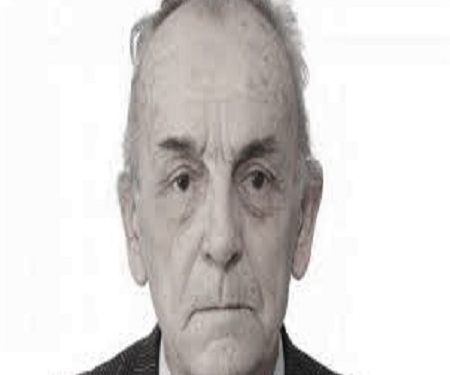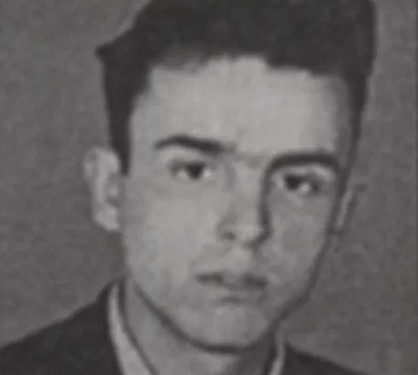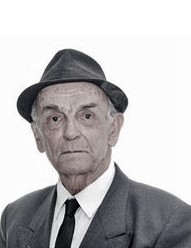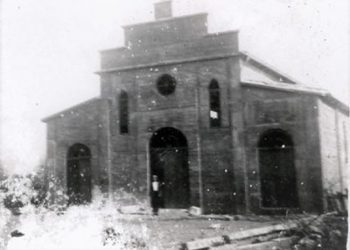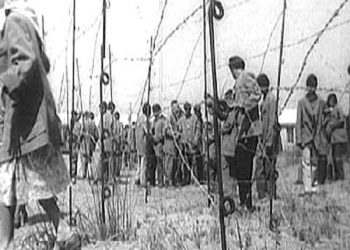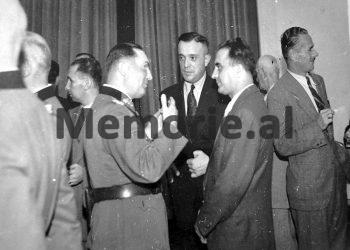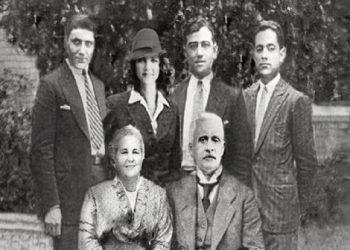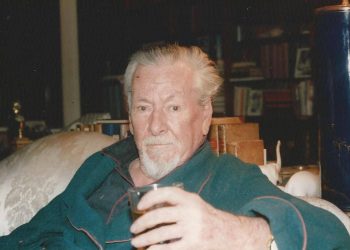By Reshat Kripa
-“People who have never known dictatorship and tyranny find it easy to give in to the rhetoric about freedom, forgetting the simple and terrible reality of oppressing the mind where it exists consciously”. –
Giovani Sartori: “Once again for the theory of democracy”.
Memorie.al / Robert Krasta had made a habit of going to the cemetery and placing a bunch of flowers on their graves on every anniversary of his parents. He would look at the picture stamped on the porcelain and start a conversation with them. He had been doing this habit for a long time. The conversation seemed to soothe his soul. He told them about everything that had happened in the family. Sometimes, when he found difficulty in something, he asked them for help, and it seemed to him that they answered him. Perhaps this, could be some guess of his own, yet he believed it.
This seemed to comfort him. He felt himself more relieved. Nearby there were two other graves, quite simple, with only the side curbs that were placed by the Municipal Enterprise and a granite slab at the top, where the names of those who were laid to rest were written. They were the graves of his friend Agron, along with his tragic family. As he finished visiting his parents’ grave, he also went to his friend’s…!
He also placed a bunch of flowers there. They were the only flowers that decorated those graves. He cleaned them of the bad plants that sprouted and wet them with water, with a bottle that he brought with him. That was the custom. There was no one else to do that job. His friend had left no one, except a brother who had abandoned him for fear of persecution. Those were hard times. He felt a pain for his friend’s fate. It seemed to him that there was a void in his absence. The friend had left deep traces on his conscience, traces that could hardly be erased one day.
This is how Robert acted on that June day, on the anniversary of the death of his mother and friend. He bought two beautiful bouquets of flowers and went to perform the usual rite. He knelt at the grave of his parents. He put the bunch of flowers and started talking to them. He felt a great longing. In his youth, he had been a chapkin boy, with a rebellious spirit. Fueled by frenzy (in mythology, jinn that enter the human soul and make him jinn), at a tender age, he rose up against the communist system and ended up behind bars. His parents were not separated, through the twists and turns where fate threw him, until they returned him to the bosom of the family.
He could not forget this. While looking at their photograph stamped on porcelain, he remembered the Bulqiza camp, in September 1955. They had organized a commemorative evening, in honor of the thirty-fifth anniversary of the Vlora War. That evening, they had recited poems dedicated to this war, by imprisoned authors. For this, they had sentenced him to three months, without meeting his family. It happened that at that time, his mother came. The authorities did not allow him to meet him.
The mother, after having traveled for two days, had to travel two more to return, moreover without meeting her son. After he was released from prison, his parents never looked at that bitter event in his life. They neither scolded him nor spoke to him, on the contrary, they stayed by his side, as if nothing had happened. Their behavior made him understand that he had returned to the bosom of the family, as before. This made him forget the suffering he had gone through. Robert stood up and headed to his friend’s graves. He was extremely surprised when he saw that instead of simple graves, a magnificent marble burial ground now stood, under which the bones of his friend’s family were buried.
Two marble slabs with inscriptions stood above the graves. In one of them was written:
BEXHET CANAJ 1900 – 1943
GJYLO CANAJ 1905 – 1985
While in the second, the inscription stood out:
GRON CANAJ 1930 – 1987
LUMTURI CANAJ 1935 – 1975
IRIDA CANAJ 1959 – 1975
In the middle of the plaques, two beautiful porcelain pictures were placed above their names. In the first, there were Agron’s parents, the father in the uniform of the Royal soldier, while the mother, a very beautiful girl. In the second, there was the photo of Agron with Lumturia and Irida, which Robert had seen several times in their house. They had come out a year before the tragedy happened. It was their last picture. They looked like angels flying in heaven. In the middle of the base of the tomb, the following epitaph was written:
YOU LOOKED FOR JOY IN LIFE,
PEOPLE HAD FORGOTTEN YOU,
BUT GOD MEANS,
I GAVE YOU EARLY FREEDOM!
Robert Krasta was surprised at the sight of that cemetery. A year ago, there were two simple graves. Who had raised it? What about his father’s remains, who had removed them from the Martyrs’ Cemetery and brought them here? Why had he done such an action? He was unable to answer these questions. He knelt beside them, placed the bouquet of flowers and was looking at the photographs and the epitaph.
– Oh God! How did you destroy this noble family? – he said with a deep pain. – How did you not feel sorry for them?
– This grave has many dilemmas, – heard a voice behind him. He turned his head and saw the specialist building the tombs.
– What did you say? – asked Robert.
– I said that this grave has many dilemmas
– Why?
– I have been working in this profession for thirty years. Since the day when little Irida died and after her Lumturia, I have not seen anyone come to this grave, except for mother Gjylos and Agron, after he got out of prison. Upon their death, it was only you who visited these graves. I thought they have no other relatives. I was very surprised when I saw my brother who came this year. I had never seen it before. He brought his father’s remains. He ordered me to build a magnificent tomb. Those flowers that you see there and that are starting to wither, he brought them the day we finished the burial. This is my dilemma.
– That dilemma is a dramatic story that you’d better not hear.
– Better not tell me. I am tired of such stories. Now excuse me I want to leave. I have to work. Goodbye!
– Goodbye!
The burial specialist left, leaving Robert quite surprised. He met Agron’s brother when his mother died and when he himself passed away. The two brothers almost didn’t get along at all. Skenderi, that was his name, had a good job. He was a company director and, fearing that he would be fired, he cut ties with his brother. During the ten years that he spent in prison, he was never sorry, he didn’t even dare to help his mother. This was the paradox of time. The day she died, he went to her funeral and left before dawn the next day.
All this, made Robert surprised with his decision to build a magnificent tomb. What had pushed him?
He didn’t speak again. He knew the cause of the dilemma that plagued the specialist, but he kept it to himself. Agron had entrusted him not to tell anyone. He looked at the epitaph written there and before his eyes, the painful event that had happened seventeen years ago appeared. It was a bitter event, one of those that are not easily forgotten and that he had learned from Agron’s own mouth. This event was now vividly before his eyes as it had happened.
August that day was ending with a lot of rain. The clouds collided with each other and during the collision, they emitted blinding flashes of lightning followed by deafening thunder.
– Summer rain, – said a passerby who was running to escape the downpour.
– Wet one side of the gun, but not the other.
– The summer has left us now – said another who was waiting for the rain to stop under the shelter of a building. Summer was really over, giving way to the dull and monotonous fall. The streets were almost empty. In the tuk, he saw a 69-year-old “Gaz” (small car, car type, covered with raincoats) moving with a director inside. The rain continued to fall, wanting to defy the intense heat that had ruled for months.
– Take this wish, I will doom you! – Rustemi, the security guard of the company’s offices, spoke to himself, staying locked in the room assigned to him. When he had good weather, he went out there and talked to the residents he met by chance. This is how he passed the time of the service, talking and often Here, making any hand of dominoes that he could. This was the only thing that fakir knew how to do. He had come down from a remote village, situated between two mountains, where the fields were like oases in the desert.
Only rye is planted in them. With these and with the few cattle they had, the villagers lived. In order to survive, the state had united this cooperative with others in the area. All these formed a united cooperative. He was fifty-eight years old. During the War, he had been a partisan, along with his father, who had fallen in the fight for freedom.
After finishing it, he became an officer. But Lumumadhi had only finished primary school, so in 1949, he was dismissed from the army. However, he had a favor. They didn’t take him back to the village, so he escaped from the cooperative. After working at various jobs, he had recently been working as a security guard for a few years. He started the service at four in the afternoon and left at six the next morning.
Meanwhile, engineer Agroni, a man in his forties, was coming down the stairs. He had studied in Sofia with excellent results. Initially, he was appointed as a simple engineer, but later, seeing his skills, he was appointed as the chief engineer of the enterprise. In addition to Bulgarian, he also knew English, French and Italian. He had a long and very regular body.
A pair of mustaches grew over his lips. The black eyes, the hair too, the broad scholarly forehead, gave him a great charm. He was a kind and smiling man. The employees did not take it out of their mouths. The best words were said about him. However, there were also some voices that whispered that, Agroni has some foreign manifestations of bourgeois ideology. One of these, after them, was also the reading of many Western books, in foreign languages, that he had at home.
– You were very late tonight, fellow chief engineer, – Rustemi told him as soon as he saw him.
– Actually, I had a lot of work. Then you see what rain is falling. Where does this blessed, one let you walk?
– Yes, yes indeed, the end is coming. Let’s sit together for a while and have a chat, because maybe the rain will stop. Agron thought for a moment and after looking outside once more, entered the guard’s room.
– Were you tired, did you get bored, Uncle Rustem?
– How do you say that word, fellow chief engineer, where does Man get tired, when he works for the common good? Long live the Party and friend Enver, who brought us these good days, without anyone asking about our fatigue. Here you are, didn’t you stay up late today?
– You are right, it is true. What will you tell us?
What have you heard being whispered around? Any new or old.
Agron knew Rustem’s character. He knew that if he scratched it, he could get a lot out of it. He was a member of the party and could certainly get out of him anything that might have been discussed in the meeting of the party organization. The events of the last few months prompted him to learn more.
– Yes, my fellow chief engineer, – he used this expression constantly, – how can I tell you. I feel sorry for you because you are a good boy and everyone loves you. So, I advise you to be careful and not talk to anyone. Agron listened attentively. These words made him understand that something had happened. He wanted to tease him further, to get something else out of him. Such a thing was not difficult, since Rustem’s naivety made such a thing easier.
– I don’t talk to anyone about things that shouldn’t be talked about, Uncle Rustem! After all, what can he talk about? Have you heard anything? Thomani, you know that we are both families of the National Liberation War. Our fathers were killed in the freedom struggle.
– Yes, I took the chief engineer friend, a week ago at the meeting of the basic organization, a couple of friends. they said some things that I didn’t like.
– And what did they say?
– They said that you read capitalist literature in foreign languages and that these have allegedly poisoned your conscience. They also said that the house was full of such banned books.
– What else? Rustem thought. A war was going on inside him as to whether or not he should tell Agron all that he had heard. Finally decided.
– They also talked about those two friends of yours, Stefani and Gjergji. They seem like very nice guys to me. They said they come from reactionary families and that you, whisper up and down, for a change in the system. To tell you the truth, I did not understand all that they were saying, but that they were against you, I understood that very well.
– But who said these words?
– Rather, the Messenger with Ibrahim. There were also some others who supported them. But aman, don’t say anything to them, because you’ll take me by the neck. They will accuse me of leaking the secret of the party and then the river will take me. I’m telling you that I like you and I’m sorry if something happens to you, because I know that nothing comes out of you. I really don’t have school, but I understand the truth very well.
Resuli was a normist, while Ibrahimi, a technician in one of the company’s facilities. Agroni had clashed with them several times, after having caught them in mistakes, regarding the implementation and standardization of the works of the object. They were almost completely incompetent. However, they were communists, while Agroni was not. This gave them the opportunity to express their jealousy in the party organization.
– Don’t worry uncle Rustem. I am silent as death.
What if the rain stopped and it’s going away now? Goodbye and have a good time. He thought that for today, he had learned a lot of things. He took the bicycle that he kept in the corridor below and started thinking about what Rustemi had told him. His words gave him the impression that, as far as the problem went in the basic organization of the party, things were complicated.
Therefore, it was necessary to think carefully about how to act. He thought of talking to Stefani and Gjergjin and explaining to them that, behind their backs, a backstage was being prepared. They had to be told everything that had happened up to that day. Until today, he had remained silent as he hoped that the case would be closed soon. He wanted not to disturb them. But with the course that the events had taken, time could not wait any longer. It needed to be discussed as soon as possible, before the matter took another path.
The thing started two months ago. Until that day he had been a carefree guy. And why not? Chief engineer himself, wife school principal, daughter excellent student, retired mother. He dedicated all this to the one who had sacrificed his life for these days. In the afternoon he went to the chess club. He was a member of the city’s representative team. While walking he heard a voice that spoke to him:
– Agron, wait for me when I came. He turned his head and saw Stefan. He was also a member of that team. They met and headed towards the Club, where they were going to hold a simultaneity.
– How did you go today? Stefan asked him.
– Like every day, full of work and trouble.
As soon as the coach saw them, he removed the warning about the delay, but they replied that they were prevented by the many jobs they had in the office. The other friends had arrived on time. Agron was the number one chess player of the team. He would develop the simultaneum with other friends. Out of ten meetings, he won seven, two were drawn, while he lost one, the one with his friend, Stefani, who was not far behind him. When the matches were over, he broke up with her and went home. On the way he happened to meet Petrit, the head of the Department of Internal Affairs. He was traveling by car. He stopped it and got off.
– How nice to meet you, – he said. – Let’s have a coffee. They got into the car and left. They entered the tourism of the city. The waiter turned to him as soon as he saw them:
– Order here, comrade chairman.
They entered a separate room, in the middle of which was a table surrounded by four comfortable armchairs.
– Two coffees and two whiskeys – ordered the chairman.
The waiter brought the order and left.
– Come on, have fun and good luck!
– Cheers!
– How are you doing with work? Did you carry out the plan?
– We had some difficulties, but we succeeded. We completed 105 percent of the five-month period.
– What is your opinion about the framework of the enterprise? Are they all committed?
– I believe that is.
– Do you believe? Do you have any doubts?
– No.
– Listen to Agron, you are our man. The party has full confidence in you, so it has been entrusted with that task. But you also have to be careful. Not everyone has your background. We have some data that some people with bad composition work there. We must monitor them, keep them under control.
– To tell you the truth, I don’t know anyone like that.
– I know, that’s why I’m talking to you. I am talking about those two engineers who are your friends, Stefan Gjokë and Gjergji
Panon…! According to the data we have, the first had uncles who were convicted politicians, while Gjergji’s grandfather escaped to the United States of America, along with hordes of traitors, in 1944. Someone helped them and they were able to finish university. This is another matter, but I have heard that, even today, something is being whispered up and down and you know that these are not good things for our country, especially in the conditions we are in today.
Agron felt as if a snake bit him. Stefani and Gjergji were close friends. He had talked with them about all kinds of problems, but never about political problems. It seemed to him as if the whiskey that the mayor had offered him was a drug, as if they had deliberately given him a glass of poison. Never until that day had he experienced such a feeling. He had a different perception of society. This perception was based on honesty and sincerity. But now he was asked to put on a mask, so that he could pretend differently and act differently. But could he play this role? Such a thing contradicted his character. He was taken aback and didn’t know how to answer.
– They are really my friends, – he finally said in a voice that seemed not to belong to him, – but I have never heard from them any expression against popular power.
The chairman looked him in the face once and then said in a tone different from the one he had used until then:
– Well, well, you’re listening to me too. They are not stupid to talk to your face. But we have to take them out with a hook. For this we must cooperate together. However, let’s leave this conversation for tonight, we will meet again. Let’s go, it’s getting late.
He drove her home. They didn’t exchange a word on the way. After wishing them good night, he left. Agron entered the house, kissed his mother, hugged his wife, Lumturi, and addressed his fifteen-year-old daughter:
– How is dad’s Irida? She ran like a butterfly and hugged him.
– Dad, when will you get the usual permission to go to the beach? – On August 1, I booked a cabin. The four of us will go and enjoy ourselves.
The president’s words had shocked him. Until that day he had been calm. He worked with dedication and felt satisfaction from his work. For him, Stefani and Gjergji were very good people. They were kind, hardworking and fair to everyone.
He did not understand the president’s words. Why did he have to stay away from them, when they were good cadres? He had told him that they were of bad political composition. But why did the grandchildren have to answer for what their uncle or grandfather had done? Moreover, the chairman had asked them to cooperate for their stay. What cooperation could he do? Become a spy! This question swirled around in his confused mind. Memorie.al




